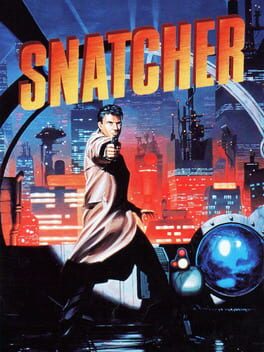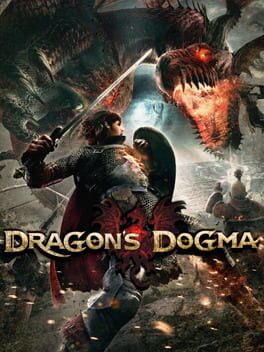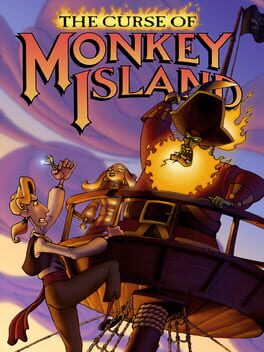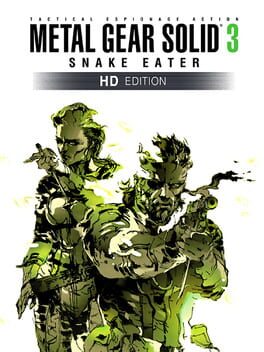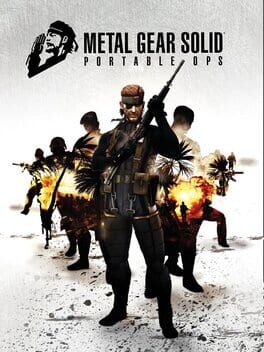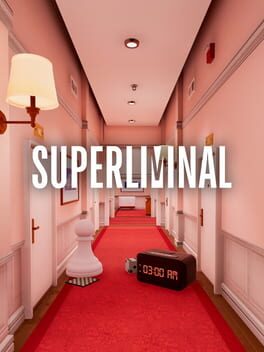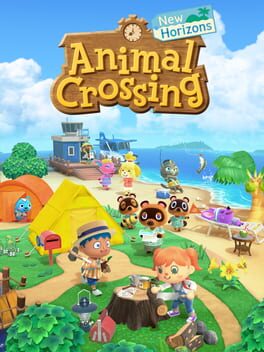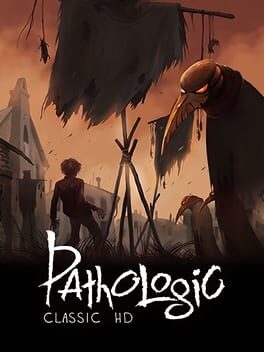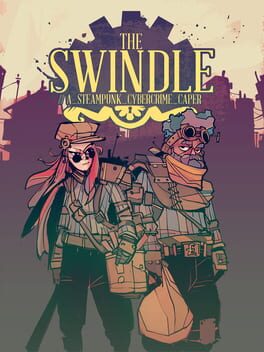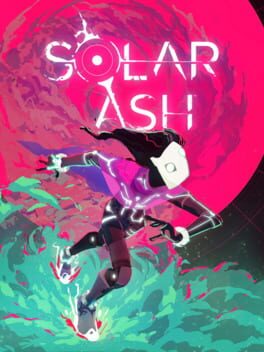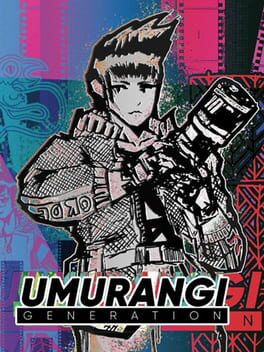nex3
BACKER
1992
Although the plot is shaky at times (particularly in the third act) and the combat is rough without a light gun, this still feels like a pristine video game. The art is still gorgeous thirty years later, moody pixel art cityscapes perfectly rendering the first wholeheartedly cyberpunk video game and providing a visual legacy for the twilight of the original cyperpunk era. Even the pacing is excellent, which is quite a trick to pull off for an adventure game—a genre I dread as much as I love simply for how much time I end up spending reading item descriptions. It's a blessing that this got a contemporary release in the west.
2012
This game is four or five brilliant ideas crammed into an ill-fitting Skyrim suit. The pawn-based AI party system is really cool, and the fights that really take advantage of it to have different party members focusing on different tasks are really fun. Climbing on bosses, pulling them off-balance, and focusing different body parts for different effects makes them feel challenging and exciting in a totally different way than action games in the Dark Souls lineage.
The moment-to-moment melee combat is also fascinating. In addition to reactive moves like parries and a dodge attack that gives a bonus if you perfect dodge (prefiguring Final Fantasy XVI), even the basic combo has a rhythm component to it: depending on the tempo of your button presses, you can keep comboing light sword swipes move into a medium finisher, or go for a heavy attack into a longer sequence of damaging strikes.
I discovered all of this within the first few minutes of playing the game, and I was over the moon. If this was the basic combat, imagine what it would look like at an advanced level! But sadly, that didn't pan out. The rhythm components I mentioned above are all there is; there's no complexity to the basic attacks beyond that. And outside of boss fights, the encounter design is entirely structured around throwing tons of mobs at you at once, so all the interesting reactive skills become largely irrelevant and AOEs become the order of the day. By the middle of the game, moving through the overworld became a slog of mob fight after mob fight—unavoidable because you have no direct control over your party—and desperately juggling inventory between the party to avoid overencumbering yourself.
This is the sort of game that was always destined to be a cult classic. It fights with its own goals too much to be a true masterpiece, but its moments of genius are still largely unexploited by the games that have come out since its release. It's left me very excited to see what they do with the sequel.
The moment-to-moment melee combat is also fascinating. In addition to reactive moves like parries and a dodge attack that gives a bonus if you perfect dodge (prefiguring Final Fantasy XVI), even the basic combo has a rhythm component to it: depending on the tempo of your button presses, you can keep comboing light sword swipes move into a medium finisher, or go for a heavy attack into a longer sequence of damaging strikes.
I discovered all of this within the first few minutes of playing the game, and I was over the moon. If this was the basic combat, imagine what it would look like at an advanced level! But sadly, that didn't pan out. The rhythm components I mentioned above are all there is; there's no complexity to the basic attacks beyond that. And outside of boss fights, the encounter design is entirely structured around throwing tons of mobs at you at once, so all the interesting reactive skills become largely irrelevant and AOEs become the order of the day. By the middle of the game, moving through the overworld became a slog of mob fight after mob fight—unavoidable because you have no direct control over your party—and desperately juggling inventory between the party to avoid overencumbering yourself.
This is the sort of game that was always destined to be a cult classic. It fights with its own goals too much to be a true masterpiece, but its moments of genius are still largely unexploited by the games that have come out since its release. It's left me very excited to see what they do with the sequel.
1999
It's impossible not to compare this to Resident Evil. This game shines on a narrative level: the plot is more robust and interesting and the environment design leans substantially less heavily on existing horror tropes and ends up legitimately unsettling as a result. The mechanics, on the other hand, are much less revelatory and end up decidedly obnoxious in boss fights that turn the tank controls from an artistic decision to a pure impediment.
The biggest innovation relative to the survival horror progenitor is the wide open city overworld shrouded in the series's iconic fog. This turns the whole dynamic of the game's resource management on its head. No longer do foes exist exclusively on a room-by-room basis, where figuring out how to successfully route around an enemy is as valid a solution as killing it. Silent Hill presents a version of the dungeon crawler's core question: will you take the risk of exploration in exchange for the rewards you may find?
Broadly speaking, if you're decent at the game, killing the foes you encounter in the overworld so you can explore it thoroughly will give you more resources than you spend. On the other hand, if you (like me) try to play this like Resident Evil and conserve your healing items and ammunition by carefully avoiding combat while making your way directly to your next objective, you'll miss not just useful items but a deeper understanding of the plot and indeed the possibility of a good ending.
Silent Hill thus ends up being a very different kind of survival horror. You're certainly still hoarding resources, but you're not running scared in the same way. The game throws frightening beasts at you but it also asks that you learn to face down and overcome them. In doing so, it dilutes the fear somewhat, and I think that's a bit of a shame.
The biggest innovation relative to the survival horror progenitor is the wide open city overworld shrouded in the series's iconic fog. This turns the whole dynamic of the game's resource management on its head. No longer do foes exist exclusively on a room-by-room basis, where figuring out how to successfully route around an enemy is as valid a solution as killing it. Silent Hill presents a version of the dungeon crawler's core question: will you take the risk of exploration in exchange for the rewards you may find?
Broadly speaking, if you're decent at the game, killing the foes you encounter in the overworld so you can explore it thoroughly will give you more resources than you spend. On the other hand, if you (like me) try to play this like Resident Evil and conserve your healing items and ammunition by carefully avoiding combat while making your way directly to your next objective, you'll miss not just useful items but a deeper understanding of the plot and indeed the possibility of a good ending.
Silent Hill thus ends up being a very different kind of survival horror. You're certainly still hoarding resources, but you're not running scared in the same way. The game throws frightening beasts at you but it also asks that you learn to face down and overcome them. In doing so, it dilutes the fear somewhat, and I think that's a bit of a shame.
2023
The core mechanic here looks incredible at first, and the first few times you play with it—as well as several of the elaborations that appear throughout the game—are stunning. But the rest of the game just can't bear its weight. The puzzles themselves are fine if by-the-book elaborations on the core conceit, but it quickly becomes clear that the designers struggled to find as much depth as they hoped in it. Perhaps the mechanic is just too complex on its face and as such too difficult to extend into a full game's length.
While you play, you are weighed down by the game's dull writing and ceaseless blandly-positive commentary from the virtual cat that follows you around. If you do take the time to pay attention to the plot, you'll quickly find that it makes no sense: a group of climate researchers created a virtual environment, but they constantly marvel at the "physics-defying wonders" they create within it, as though physics within a simulation of your own design is anything more than you say it is. The player is "caught" in the virtual reality despite an early scene clearly showing them in more of a VR booth than jacked into a headset. It's boring, it's sloppy, and it would be an unambiguously better game if it just presented a series of puzzles without any commentary.
While you play, you are weighed down by the game's dull writing and ceaseless blandly-positive commentary from the virtual cat that follows you around. If you do take the time to pay attention to the plot, you'll quickly find that it makes no sense: a group of climate researchers created a virtual environment, but they constantly marvel at the "physics-defying wonders" they create within it, as though physics within a simulation of your own design is anything more than you say it is. The player is "caught" in the virtual reality despite an early scene clearly showing them in more of a VR booth than jacked into a headset. It's boring, it's sloppy, and it would be an unambiguously better game if it just presented a series of puzzles without any commentary.
2015
Games, like movies, used to just have jokes in them. Not just absurd circumstances, not darkly humorous satires, but actual jokes that exist for no reason other than to evoke a chortle. Indeed, games like this were jam-packed with them, feeling no obligation to create a logically cogent or historically accurate world when you could instead extract a few laughs from a pirate doing community theater or a laser-guided cannon.
Not every joke lands, but that hardly matters when they come so fast, so thick, and so confidently. Not every puzzle makes sense, but that's what hint websites are for. This game isn't a masterpiece, but it's a great way to spend ten hours—especially if you've got a few friends to play it with.
Not every joke lands, but that hardly matters when they come so fast, so thick, and so confidently. Not every puzzle makes sense, but that's what hint websites are for. This game isn't a masterpiece, but it's a great way to spend ten hours—especially if you've got a few friends to play it with.
Let's begin with some brutal honesty: pressure-sensitive buttons were a bad idea, and building a combat system around them was a worse one. The control scheme here is generally a bit of a mess, and the boss fights that ask you to engage with it at speed are fairly infuriating. I was never able to hold someone up on command, I couldn't reliably get a silent takedown even by the end of the game, and I'm grumpy about it.
But that's pretty much my sole complaint about this otherwise magnificent game. The stealth sections are classic high-quality Metal Gear fare, Kojipro's signature mechanical crunch is toothsome and often hilarious, and The End is an all-time excellent boss fight.
But where the game really shines is its writing, plot, and characterization. Metal Gear Solid has always been famous for its signature combination of intense historical fiction with larger-than-life goofiness, but it's never worked quite as well as it does here. Because MGS3 is a prequel, it's forced to be a little more grounded both in its technology and its themes. This helps it rein in its complexity and focus on developing the core motivations that drive the rest of the series and add depth and clarity to the previous entries.
It's also hard to overstate just how fun the cutscenes are here. Every moment Ocelot is on screen is a screaming delight, setting up his gunplay romance with Snake and setting sky-high expectations for his characterization that are frankly not quite lived up to in other games (except *V*). The Boss is the glaring exception to the rule of thumb that Kojima can't write women, a deep and fascinating character who fully earns her place as the moral heart of the entire series. Even the sequences with Eva are fun, even if it's impossible to believe for a second that Snake is heterosexual.
But that's pretty much my sole complaint about this otherwise magnificent game. The stealth sections are classic high-quality Metal Gear fare, Kojipro's signature mechanical crunch is toothsome and often hilarious, and The End is an all-time excellent boss fight.
But where the game really shines is its writing, plot, and characterization. Metal Gear Solid has always been famous for its signature combination of intense historical fiction with larger-than-life goofiness, but it's never worked quite as well as it does here. Because MGS3 is a prequel, it's forced to be a little more grounded both in its technology and its themes. This helps it rein in its complexity and focus on developing the core motivations that drive the rest of the series and add depth and clarity to the previous entries.
It's also hard to overstate just how fun the cutscenes are here. Every moment Ocelot is on screen is a screaming delight, setting up his gunplay romance with Snake and setting sky-high expectations for his characterization that are frankly not quite lived up to in other games (except *V*). The Boss is the glaring exception to the rule of thumb that Kojima can't write women, a deep and fascinating character who fully earns her place as the moral heart of the entire series. Even the sequences with Eva are fun, even if it's impossible to believe for a second that Snake is heterosexual.
This is a fascinating little object. Of the Metal Gear games not written by Kojima, this seems to be the one that's closest to actual canon, with Kojima himself reportedly holding different positions on the subject at different times.
The plot acts as almost a direct sequel to MGS3, and although it has some weird threads that seem to have been totally dropped (like the shadowy figure said to have orchestrated all the events in the prior game) in many ways it fits well within the canon. The conflict between different people's interpretation of The Boss's dream is at the heart of the series, and this game provides one of the clearest explications of that: Gene's and Big Boss's views of what a nation of soldiers could be is front and center. The tension between the CIA and the DOD is similarly a clever real-world touch that follows the political interests of the series as a whole.
Mechanically this is much less "MGS3 2" and much more "MGSV 0". Here is the genesis of a vision of Metal Gear as discrete levels you can revisit on your own recognizance rather than a linear path through a story. Here is the first time the idea of "a nation of soldiers" is encoded mechanically as recruiting enemies in-game. This recruitment mechanic is achingly clunky, involving massive amounts of time just searching for hiding spots and dragging bodies for minimal in-game payoff. But it's so immediately enticing the player is compelled to engage with it anyway. It was wise of them to expand this into an entire game in its own right (and to dramatically smooth out its mechanics).
The game has its frustrations, as well. Boss fights are frustrating on beyond their usual annoyance, not just because of the clunky PSP camera controls but also the nature of the game itself. The player has extremely limited inventory slots and is generally incentivized to go into levels with them empty so as to be able to carry home more resources. Health and particularly stamina are often low across multiple levels. But when a boss fight shows up by surprise after an involved sneaking section, the player has only the resources on hand to fight it. If they think one particular piece of equipment is needed, they have to do the entire level over just to test their theory.
For that reason, I set the game down upon encountering the Null fight and just watched the rest of the dialog and cutscenes on YouTube. But even so, I'm fond of it: it's a black sheep, it's undeniably flawed, but the series after this (and particularly my favorite MGS game) wouldn't be as strong without this strange entry's existence.
The plot acts as almost a direct sequel to MGS3, and although it has some weird threads that seem to have been totally dropped (like the shadowy figure said to have orchestrated all the events in the prior game) in many ways it fits well within the canon. The conflict between different people's interpretation of The Boss's dream is at the heart of the series, and this game provides one of the clearest explications of that: Gene's and Big Boss's views of what a nation of soldiers could be is front and center. The tension between the CIA and the DOD is similarly a clever real-world touch that follows the political interests of the series as a whole.
Mechanically this is much less "MGS3 2" and much more "MGSV 0". Here is the genesis of a vision of Metal Gear as discrete levels you can revisit on your own recognizance rather than a linear path through a story. Here is the first time the idea of "a nation of soldiers" is encoded mechanically as recruiting enemies in-game. This recruitment mechanic is achingly clunky, involving massive amounts of time just searching for hiding spots and dragging bodies for minimal in-game payoff. But it's so immediately enticing the player is compelled to engage with it anyway. It was wise of them to expand this into an entire game in its own right (and to dramatically smooth out its mechanics).
The game has its frustrations, as well. Boss fights are frustrating on beyond their usual annoyance, not just because of the clunky PSP camera controls but also the nature of the game itself. The player has extremely limited inventory slots and is generally incentivized to go into levels with them empty so as to be able to carry home more resources. Health and particularly stamina are often low across multiple levels. But when a boss fight shows up by surprise after an involved sneaking section, the player has only the resources on hand to fight it. If they think one particular piece of equipment is needed, they have to do the entire level over just to test their theory.
For that reason, I set the game down upon encountering the Null fight and just watched the rest of the dialog and cutscenes on YouTube. But even so, I'm fond of it: it's a black sheep, it's undeniably flawed, but the series after this (and particularly my favorite MGS game) wouldn't be as strong without this strange entry's existence.
2019
At the end of the day, this game is a dollhouse that makes you grind for pieces. That's honestly a pretty solid pitch, and the main reason I've put it away for the most part is that I'm not feeling up to investing the combination of creativity and grinding to make every zone exactly how I want it. Even though I've put this down, I also put many hours into it so I can't say it didn't serve its purpose.
No doubt about it, this game is a slog. I only played the Bachelor's route, and that alone took 30+ hours of playtime, most of which was spent just reloading saves as I tried to navigate the town without dying. It's also surreal, haunting, and beautiful. In many ways, the pain of playing is wrapped up in this beauty: the game is about the suffering required to do right and the difficulty of understanding what "right" even is, and the friction in playing can easily be read as part of that. I'm not likely to jump right into the next route (and in fact I'll probably just focus on Pathologic 2 from here out), but I'm very glad to have experienced this much.
2015
There is the germ of something really special here. The core of the game—infiltrating and stealing from increasingly well-guarded houses with roguelike progression giving you more tools and protections—is great, and at every step of the game I was expecting it to unfold into something really fun. But it's held back by a mountain of minor issues that all add up to make it really frustrating to put your all into.
Most of these are things that could be fixed with a few more rounds of in-depth playtesting. Why does the attack animation not match its hitbox when understanding its hitbox is crucial for safely engaging with enemies? Why can the starting level have loot you're guaranteed to be unable to access when getting all the loot on the first level gives you a bonus worth 4x the loot itself? Why does it go into slow motion every so often without rhyme or reason?
There is a class of media that hits a particular point on the quality spectrum where it fails to live up to its ambition, but the path to that ambition is so clear that it practically dares you to imagine a better version. The Swindle is in that class. I hope one day someone is inspired by it to make something that lives up to everything it could be.
Most of these are things that could be fixed with a few more rounds of in-depth playtesting. Why does the attack animation not match its hitbox when understanding its hitbox is crucial for safely engaging with enemies? Why can the starting level have loot you're guaranteed to be unable to access when getting all the loot on the first level gives you a bonus worth 4x the loot itself? Why does it go into slow motion every so often without rhyme or reason?
There is a class of media that hits a particular point on the quality spectrum where it fails to live up to its ambition, but the path to that ambition is so clear that it practically dares you to imagine a better version. The Swindle is in that class. I hope one day someone is inspired by it to make something that lives up to everything it could be.
2021
An ambitious, janky, beautiful, frustrating game. When the movement works, it feels marvelous, gliding through levels with a gripping sense of momentum, pausing time and cracking heads as you go. But you can lose that momentum just by hitting a corner of geometry wrong, and the game stumbles in similar ways. Enemies quickly become a matter of just trying to guess when you're in the radius that a grapple autokill will work, and exploration turns into trying to figure out mapless exactly which cloudy enclave you might have left unviewed.
The bosses are the worst part by far. They ask the player to navigate between waypoints at a breakneck pace, which could be exciting if it were less repetitive and failures felt earned. But instead, any hiccup of geometry dooms a run and pushes the player out to scavenge up another shield box and try again.
The bosses are the worst part by far. They ask the player to navigate between waypoints at a breakneck pace, which could be exciting if it were less repetitive and failures felt earned. But instead, any hiccup of geometry dooms a run and pushes the player out to scavenge up another shield box and try again.
2019
2020
